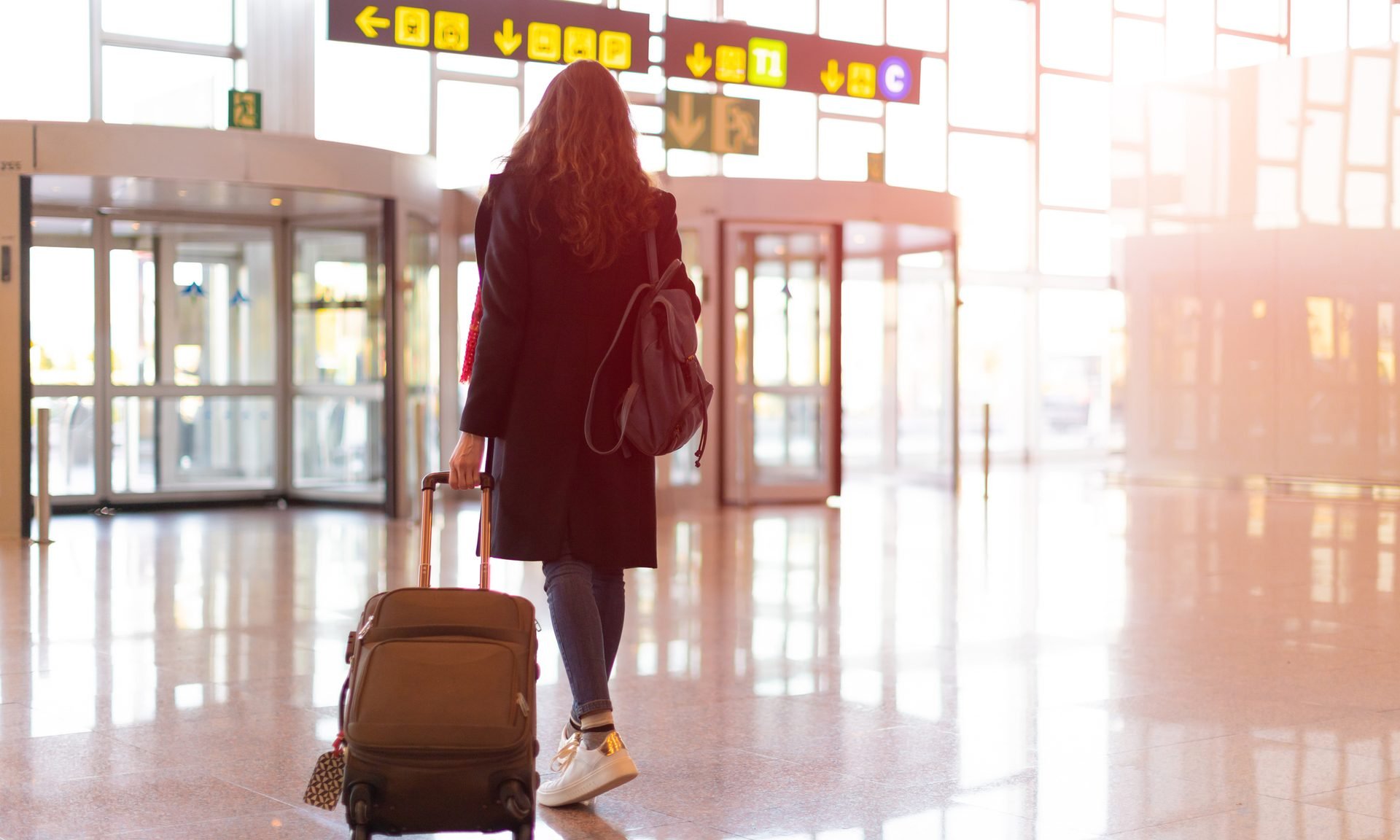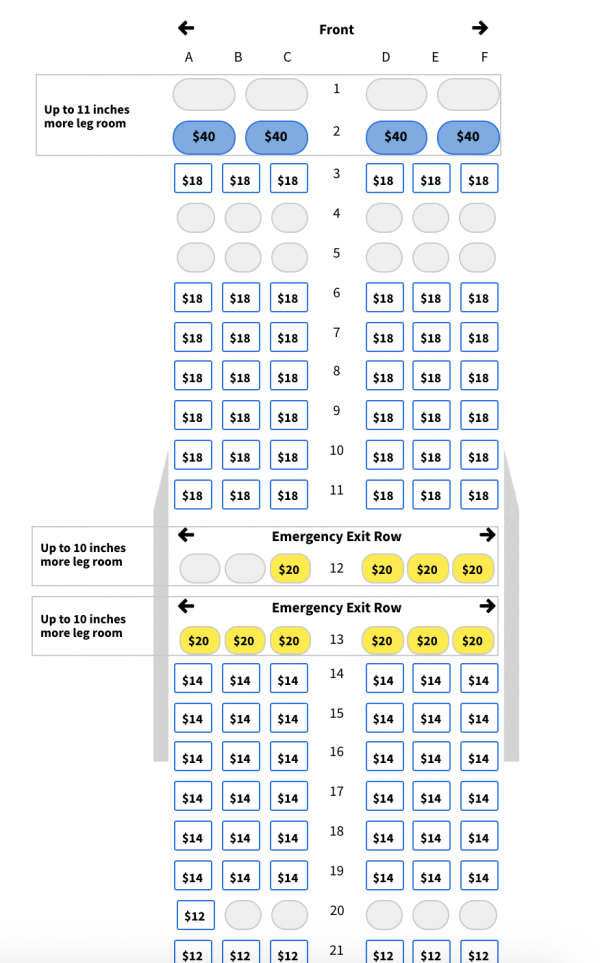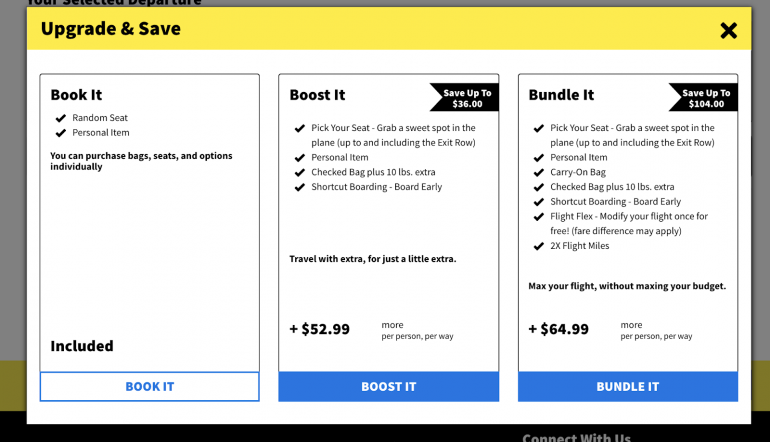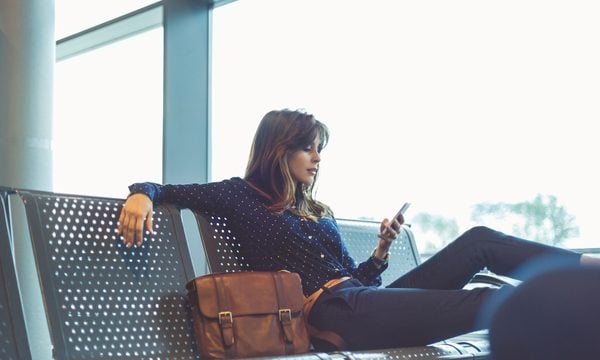What You Need to Know About Spirit Airlines Fees
Spirit's fees can make your cheap flight more expensive than fares on full-service airlines.

Many or all of the products on this page are from partners who compensate us when you click to or take an action on their website, but this does not influence our evaluations or ratings. Our opinions are our own.
It can be easy to be fooled into thinking you scored a deal after nabbing a $26 flight to Las Vegas on Spirit Airlines.
But while the airfare itself is certainly cheap, there’s a good chance your total flight costs will far exceed $26. That’s because Spirit Airlines has one of the most comprehensive a la carte pricing models of any airline. Spirit seats on their own tend to be tantalizingly cheap, but things that other airlines typically include in the cost of airfare — like soft drinks and reserved seats — will cost you extra.
Suddenly, your $26 flight might start to cost the same, or even more, than the fares listed for non-budget airlines.

» Learn more: Spirit Airlines: The complete guide
Spirit Airlines bag fees
Base fares include one personal item, like a laptop bag or purse. But don’t think you can get away with not having to pay by stuffing all your possessions into a backpack, as even that might not fit. Spirit defines a personal item as anything 18 by 14 by 8 inches or smaller. Even something like this fairly standard-size Adidas backpack would be too large by Spirit standards.
For larger bags, like that backpack or rolling luggage, there’s a good chance that the cost to fly your stuff is more than the cost to fly yourself.
Spirit doesn’t publish standard bag fees, as they can vary not only based on route but also on when you pay for them. And the longer you wait, the more you’ll pay. If you’re paying at the gate, you could end up paying nearly twice as much as if you had paid the bag fee at the time of booking.
While fees can fluctuate, here’s what Spirit bag fees look like for the aforementioned $26 flight between Seattle and Las Vegas:
| When bags are paid for | Carry-on bag | 1st checked bag | 2nd checked bag |
| During Spirit.com booking | $35. | $33. | $42. |
| After booking, but before checking in online | $45. | $43. | $52. |
| During online check-in | $45. | $43. | $52. |
| At the airport (before the gate) | $55. | $50. | $60. |
| At the gate | $65. | $65. | N/A. |
And that’s assuming your baggage weighs 50 pounds or less. Here are the additional fees you’d pay per bag if transporting large or heavy items:
| Item | Additional charge (on top of bag fee) |
| Baggage weighing 51-100 lbs. | +$125. |
| Items measuring 63-80 linear inches (length + width + height) | +$150. |
| Items over 80 linear inches (length + width + height) | +$150. |
| Bicycle | +$75. |
| Surfboard (maximum of 2 surfboards per bag) | +$100. |
For customers enrolled in Spirit’s add-on membership program called Spirit Saver$ Club, there’s some good news: Bag fees are discounted. The membership costs $69.95 for 12 months, $99.90 ($5 savings) for 18 months and $129.90 ($10 savings) for 24 months.
Here’s how much typical bag fees cost for that same flight if you’re a member of the Spirit Saver$ Club:
| When bags are paid for | Carry-on bag | 1st checked bag | 2nd checked bag |
| During Spirit.com booking | $26. | $24. | $33. |
| After booking, but before checking in online | $36. | $34. | $43. |
| During online check-in | $36. | $34. | $43. |
| At the airport (before the gate) | $55. | $50. | $60. |
| At the gate | $65. | $65. | N/A. |
What does Spirit consider a personal item vs. carry-on vs. checked bag?
Depending on the size of your bag, it might not be considered a personal item, even if it fits under the seat in front of you. What’s more, you might not be able to carry it on, even if you think it’s a relatively small suitcase. Here’s how Spirit defines each type of bag:
- Personal item: Maximum of 18 by 14 by 8 inches, including handles and wheels.
- Carry-on: Maximum of 22 by 18 by 10 inches, including handles and wheels.
- Checked bag: Maximum of 62 linear inches (length plus width plus height) including handles and wheels, and less than 100 pounds (overweight/oversize baggage fees apply).
Get the 'Cheat Codes' to Cheaper Travel
Unlocking the secret to saving a ton on travel is easier than you think. 📤 Our free newsletter shows you how in 5 min. or less.

Spirit Airlines change and cancellation fees
Spirit Airlines doesn't charge change or cancellation fees on Go Savvy, Go Comfy and Go Big fares.
But less than a year after doing away with these fees entirely, the airline recently reinstated them for Go tickets purchased after Feb. 5, 2025. The rates:
- Changing flights 60+ days before departure: Free.
- Changing flights within 31–59 days of departure: $59.
- Changing flights within seven to 30 days of departure: $79.
- Changing flights within seven days: $99.
- Canceling flights: $99 cancellation fee.
» Learn more: Plan your next redemption with our airline points tool
Fees to check in and obtain your boarding pass for your Spirit flight
There’s no fee to check in online for your Spirit flight. Once checked in, print your boarding pass at home, too, because it’s free.
But if you fail to plan ahead, you’ll have to pay up.
If you need to print your boarding pass at an airport kiosk, it costs $2. If you’re a luddite who prefers bypassing the kiosk in favor of a human, it costs even more: $10 to have your boarding pass printed by an airport agent.
Spirit waives those fees in a few circumstances, such as if you’re traveling as an unaccompanied minor, with a lap infant, or if you’re using a military ID instead of a passport and are unable to check in online.
Fees to select a seat ahead of time
Whether you’re trying to avoid the middle seat or you just want to guarantee that you can sit next to your kid, it’s going to cost you to choose your seat ahead of time.
Spirit doesn’t have a published list of seat assignment pricing as it varies per flight, though the airline says all seat reservations start at a minimum of $5.
But $5 is a liberal assumption for how much you’ll actually pay to reserve your seats. Here’s how much seat assignments cost on that same $26 flight between Seattle and Las Vegas:

The "Big Front Seats" have more legroom, are wider (no middle seat in the row) and cost an additional $40. The often-coveted seats in the emergency exit rows cost $20, and even a middle seat near the back costs $12 to reserve.
Fees for in-flight refreshments
Fees for in-flight food and alcoholic beverages are common across all airlines. Some more generous airlines will dole out complimentary in-flight snacks (we see you, Delta Biscoff cookies and JetBlue Terra Chips). But Spirit won’t even throw in a free Diet Coke.
All refreshments sold in-flight on Spirit come with a fee, such as coffee ($2), sodas and juices ($3), beer and wine ($8) and snacks like Pringles or Oreos (starting at $3).
In-cabin pet fee
Spirit charges $110 per pet container, each way, with a limit of four pets total in the cabin. Spirit allows you to put two pets in one container. If you are traveling with a pet or two, they’ll always ride with you in-cabin, as Spirit does not transport pets in cargo.
And even still, there are a number of limitations. Pets need to be small, since the container must fit under the seat, and pets must be able to stand and turn around in the container. Plus, the combined weight of the pet and carrier must be 40 pounds or less.
Priority boarding and security access
For an additional fee, you can whiz through security and be one of the first to board the plane. Starting at $7.99, Spirit’s “Shortcut Boarding” access allows you priority boarding in Zone 2.
Depending on the airport you’re departing from, you may also be able to pay for "Shortcut Security," though we don’t recommend it. It’s not TSA PreCheck, but it will allow you to go through security in an expedited lane. Costs vary per airport but don’t exceed $20, though it's not a guarantee your airport even offers the Shortcut Security program.
Unaccompanied minor fees
Is your kid flying alone? That’s an extra $100.
You’ll get hit with that unaccompanied minor fee if the child is 5-14 years old. On the bright side, Spirit will throw in a free snack and drink for your kid, a solid $6 value.
Spirit won’t allow children to fly alone if they’re 4 or younger, or if they’re traveling on a connecting flight, international flights or domestic flights that include a scheduled change of aircraft.
Bundle packages
Spirit offers bundled packages during the booking process. If you anticipate paying for a number of these fees anyway, then bundling them isn’t a bad deal.
Going back to that same flight between Seattle and Las Vegas, it costs $52.99 more for the Boost It package and $64.99 for the Bundle It package.

Here’s how much it would cost to order a la carte what you can get in the combo packages for one set price:
Boost It package (costs $52.99):
- Pick Your Seat: $20 (exit row!).
- Personal item: $0 (already included with airfare).
- Checked Bag plus 10 pounds extra: $33 (if the bag weighs 40 pounds or less) or $63 (if it weighs 50 pounds or less).
- Shortcut Boarding: $7.99.
The Boost It package is worth $88.99 in this scenario (if you take advantage of the 50 pound allowance), which is a $36 savings. If your bag is less than 40 pounds ($33) but you want to pick a seat ($20) and have Shortcut Boarding ($7.99), then you save only a few dollars on the Boost It bundle price. But if your bag is in that weight sweet spot (40-50 pounds), you’ll save $36 with this bundle.
Bundle It package (costs $64.99):
- Pick Your Seat: $20.
- Personal item: $0 (already included with airfare).
- Checked Bag plus 10 pounds extra: $33 (if the bag weighs 40 pounds or less) or $63 (if it weighs 50 pounds or less).
- Shortcut Boarding: $7.99.
- Flight Flex: $45.
- 2x miles*.
*It’s tough to assign a value to Spirit miles because you accrue a different number of miles based on your status within the Free Spirit program.
The 2x miles aside, the Bundle It package is worth $133.99 in this scenario, which is a $69 savings if you were to buy each item individually at booking. Spirit says it’s a $104 savings value, based on the company’s own mileage valuation.
Again, if you are packing that oversize bag (between 40 and 50 pounds) or you want the Flight Flex option (which we don’t really recommend), then it’s worth it. But if you want only a few things — say one checked bag that weighs less than 40 pounds, the ability to choose your seat and shortcut boarding — keep buying a la carte.
Fees across U.S. airlines
In NerdWallet's most recent analysis of airline fees, we compared seat selection, checked baggage and overhead carry-on baggage fees charged by the major U.S. airlines on typical one-way fares.
Here's how they stacked up:
Frequently Asked Questions
What fees does Spirit Airlines charge?
Spirit is a low-cost carrier, which means that the price you pay for the flight will include only the ticket itself. You will need to pay for everything you’d like to add such as bags, printing your boarding pass at the airport, selecting your seat, award redemption fees, meals on the flight, early boarding and more. The fees fluctuate based on when you purchase these add-ons, so a bag purchased at booking will be cheaper than if you purchase it at the gate.
Is Spirit really cheaper?
Because Spirit is a low-cost carrier, you will need to pay extra for everything other than the flight. So, if you’ll be checking a bag, printing your boarding pass at the airport, purchasing food on the plane and paying for a seat up front, you’ll end up paying for each of these add-ons, which will increase the price of your ticket. If you often fly with Spirit and value these extras, the carrier offers the Spirit Saver$ Club, which provides discounts on bags, seats and more.
Do you have to pay for seats on Spirit?
Spirit will assign a random seat to you during the check-in process. However, if you’d like to choose your own seat or select one at booking, you will need to pay for it. The proximity to the front of the plane also affects the cost of the seat. If you’re interested in the Big Front Seat, which is Spirit’s equivalent of domestic first class, it will be cheaper to purchase this seat in advance instead of at the airport.
Is a backpack free on Spirit?
You are allowed one personal item (e.g., purse, small backpack) free of charge. The dimensions must not exceed 18 x 14 x 8 inches (45 x 35 x 20 cm) including handles and wheels. If your backpack is larger, refer to the carry-on and checked bag price list.
The bottom line
Book your $26 flight, but expect to spend a lot more than that.
You might have thought you could get away without a carry-on when you booked the flight, but as you start packing, you realize you’ll need a small rolling suitcase. That’s an extra $45 at check-in.
You don’t have a printer, so you’ll have to pay $2 to print your boarding pass at the airport kiosk.
You don’t want the middle seat so you accept you’ll pay $14 to choose an aisle, but why pay $14 for an aisle when it’s only $6 more for the exit row aisle? You pay $20 to choose a good seat.
Once flying, you pay $3 for a ginger ale. While your credit card is already out, you throw in Sea Salt PopCorners for $4.
Suddenly, your $26 flight has become $100. That’s not even including a number of other fees you might end up paying too, like pet fees, priority boarding and more.
Don’t be fooled into thinking Spirit has ultra-cheap fares. Traveling with Spirit is cheap if you pack uber-light — and pack your own snacks. For budget travelers who can plan ahead, Spirit can be a deal. But pay attention when booking, because your “cheap” Spirit flight might cost more than a ticket on any of the other airlines.
How to maximize your rewards
You want a travel credit card that prioritizes what’s important to you. Here are some of the best travel credit cards of 2026:
- Flexibility, point transfers and a large bonus: Chase Sapphire Preferred® Card
- No annual fee: Wells Fargo Autograph® Card
- Flat-rate travel rewards: Capital One Venture Rewards Credit Card
- Bonus travel rewards and high-end perks: Chase Sapphire Reserve®
- Luxury perks: American Express Platinum Card®
- Business travelers: Ink Business Preferred® Credit Card
Article sources
NerdWallet writers are subject matter authorities who use primary,
trustworthy sources to inform their work, including peer-reviewed
studies, government websites, academic research and interviews with
industry experts. All content is fact-checked for accuracy, timeliness
and relevance. You can learn more about NerdWallet's high
standards for journalism by reading our
editorial guidelines.
Limited Time Only: Earn $1,000 Toward Travel!
Capital One Venture Rewards Credit Card 
Travel

For a limited time, the
Capital One Venture Rewards Credit Card is offering new cardholders an especially rich bonus: Enjoy $250 to use on Capital One Travel in your first cardholder year, plus earn 75,000 bonus miles once you spend $4,000 on purchases within the first 3 months from account opening - that’s equal to $1,000 in travel!
More like this




